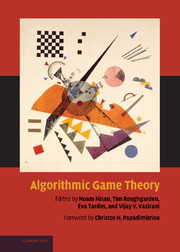Book contents
- Frontmatter
- Contents
- Foreword
- Preface
- Contributors
- I Computing in Games
- 1 Basic Solution Concepts and Computational Issues
- 2 The Complexity of Finding Nash Equilibria
- 3 Equilibrium Computation for Two-Player Games in Strategic and Extensive Form
- 4 Learning, Regret Minimization, and Equilibria
- 5 Combinatorial Algorithms for Market Equilibria
- 6 Computation of Market Equilibria by Convex Programming
- 7 Graphical Games
- 8 Cryptography and Game Theory
- II Algorithmic Mechanism Design
- III Quantifying the Inefficiency of Equilibria
- IV Additional Topics
- Index
2 - The Complexity of Finding Nash Equilibria
from I - Computing in Games
Published online by Cambridge University Press: 31 January 2011
- Frontmatter
- Contents
- Foreword
- Preface
- Contributors
- I Computing in Games
- 1 Basic Solution Concepts and Computational Issues
- 2 The Complexity of Finding Nash Equilibria
- 3 Equilibrium Computation for Two-Player Games in Strategic and Extensive Form
- 4 Learning, Regret Minimization, and Equilibria
- 5 Combinatorial Algorithms for Market Equilibria
- 6 Computation of Market Equilibria by Convex Programming
- 7 Graphical Games
- 8 Cryptography and Game Theory
- II Algorithmic Mechanism Design
- III Quantifying the Inefficiency of Equilibria
- IV Additional Topics
- Index
Summary
Abstract
Computing a Nash equilibrium, given a game in normal form, is a fundamental problem for Algorithmic Game Theory. The problem is essentially combinatorial, and in the case of two players it can be solved by a pivoting technique called the Lemke–Howson algorithm, which however is exponential in the worst case. We outline the recent proof that finding a Nash equilibrium is complete for the complexity class PPAD, even in the case of two players; this is evidence that the problem is intractable. We also introduce several variants of succinctly representable games, a genre important in terms of both applications and computational considerations, and discuss algorithms for correlated equilibria, a more relaxed equilibrium concept.
Introduction
Nash's theorem – stating that every finite game has a mixed Nash equilibrium (Nash, 1951) – is a very reassuring fact: Any game can, in principle, reach a quiescent state, one in which no player has an incentive to change his or her behavior. One question arises immediately: Can this state be reached in practice? Is there an efficient algorithm for finding the equilibrium that is guaranteed to exist? This is the question explored in this chapter.
But why should we be interested in the issue of computational complexity in connection to Nash equilibria? After all, a Nash equilibrium is above all a conceptual tool, a prediction about rational strategic behavior by agents in situations of conflict – a context that is completely devoid of computation.
- Type
- Chapter
- Information
- Algorithmic Game Theory , pp. 29 - 52Publisher: Cambridge University PressPrint publication year: 2007
- 37
- Cited by



